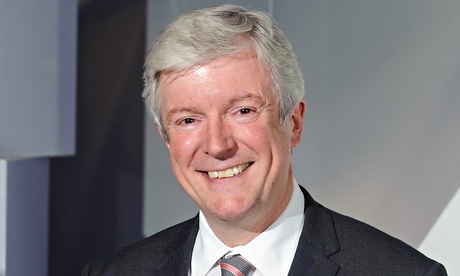
The BBC could open up other areas beyond TV production to greater competition – including news, radio and online – under Tony Hall’s radical “Compete or Compare” plan to deregulate the corporation’s operations.
Hall, the BBC director general, said on Thursday morning that the plan, which will see in-house TV production spun off as a standalone subsidiary and allowed to make shows for rivals for the first time, marked a stripping-away of regulation that would enable an era of unprecedented competition.
“We are going to go further than we have ever done before in opening the BBC to more competition,” he said, in a speech at The Future of the Licence Fee event at London’s City University. “I want a less regulated system that ensures that both our own BBC producers and those of the independent sector have creative freedom. I want a level playing-field between BBC producers and independent ones.”
Hall said that the new Compete or Compare strategy could be extended to radio, news and current affairs programming and its digital and technology operations.
“Can we extend competitive access for independent producers in radio, if that will mean broader choice and better ideas?,” he said. “Is there more we can do in news and current affairs, where independent producers and film-makers already make a vital contribution?”
He added: “What can we do in online production? In the sharing of technology, so that we are building open platforms others can use and build on?”
However, Hall said certain core public service broadcasting areas would remain exempt from Compete or Compare, citing global newsgathering, where the risks of outsourcing to a rival was just too great.
“It has its own ethos, and the hard discipline of BBC training and neutrality,” he said. “It would be hard to contract that out without losing control of our voice. We can’t have competition everywhere. I am not ideological about competition. There are some BBC activities where competition would not add value.”
In core PSB operations that remain protected Hall said that the BBC would use private sector competition as a benchmark to be more efficient.
Hall said that making the corporation more financially efficient would not lead to a “low rent BBC”.
“My aim in all this work is a world-class BBC,” he said. “Not a low rent BBC. Value for money is what matters – not to be the cheapest, but the most efficient for the quality we are trying to achieve.”
He said that the drive for a leaner, more cost-conscious corporation would not stop it paying top dollar for talent, or paying for people to “stay in hotels”.
“We are going to carry on hiring the best talent and paying them what they are worth,” he said. “We are going to carry on sending our correspondents abroad, we are going to carry on flying crews to make natural history programmes on the other side of the world, we are going to carry on making history programmes about other places, we are going to carry on covering stories from all over the UK. And yes, the people who make them will have to stay in hotels.”
Hall also gave a hint of how he sees his Compete or Compare strategy influencing the wider debate about the future of the BBC.
“We will need every saving we can from these initiatives so that we don’t have to close any more services,” he said. “But more than that, I will not make a case about the future level of the licence fee until I am confident.”
“Firstly, that we have done everything to make the BBC as efficient as possible. Secondly, that we have a plan for how we will drive continuous efficiency throughout the organisation through the next charter.”
The body representing the UK’s independent radio production companies said it “emphatically” approved of opening up BBC radio.
“Regardless of the state of the overall radio market, as far as the BBC is concerned more creative competition from both external suppliers, as well as a healthy in-house production base, will be a creatively powerful, and cost-effective approach to bringing the widest possible range of stories, ideas, perspectives and talent to the licence fee payer,” said Phil Critchlow, the chairman of the Radio Independents Group.
• To contact the MediaGuardian news desk email media@theguardian.com or phone 020 3353 3857. For all other inquiries please call the main Guardian switchboard on 020 3353 2000. If you are writing a comment for publication, please mark clearly “for publication”.
• To get the latest media news to your desktop or mobile, follow MediaGuardian on Twitter and Facebook.

